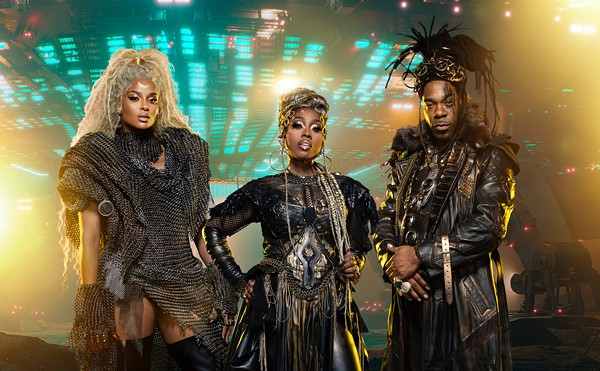Meaningful communication often unfolds without a single word. Otherworldly experiences at times take place within the most earthly settings. And loud, invasive noises can wash over your ears, envelop your brain and soothe your entire being. Cascading from simplistic, repetitive echoes to complicated, layered masks of fuzzy sound squalls, the mysterious instrumental beauty of Paik accomplishes all of this and more — 30 to 45 minutes at a time.
“What we do is pretty simple,” admits bassist Ali Clegg, when describing the band’s live sets and the songs captured on Corridors, Paik’s second album which comes out April 30.
“Nobody comes into (practice) with, ‘I wrote this song. This is how it goes.’ We just all play what we feel and it comes together that way. That’s the only way we know how to do it,” adds drummer Ryan Pritts.
Guitarist Rob Smith describes Paik’s style of playing as “a collective mood thing.”
The three met around four years ago while playing in different bands in Toledo, Ohio. Fed up with bands that never seemed to follow through with ideas, Clegg, Pritts and Smith decided to get together for a practice. Within a month, they had seven or eight songs and began playing out and recording. Two years ago, they relocated to Detroit’s Cass Corridor.
After dealing with a noise-unfriendly sheriff for a neighbor and $275-a-month rental practice spaces in Toledo, they now own, live and practice in a multilevel building on Cass that has so many doors, stairways and rooms, you could get lost. Like their music, it’s relaxing and intense, with comfortable couches in the middle of a large room with vibrantly colored film posters and elegant lamps placed on perfectly peeling, seafoam painted walls.
“I do think where we live now is important. I can’t imagine living anywhere else in the city except right here,” Pritts says looking around the room.
The way the three members describe Paik’s music and environment draws resemblance to the flexible group dynamic displayed within the music as well: They finish each other’s sentences, build upon ideas, agree wholeheartedly, disagree profusely and sum up thoughts in a fantastic flurry of everyone talking at once.
“Some of our songs are like conversations, some are like arguments, some of them are singy almost,” Clegg says. “They’re always some type of trying to communicate something to somebody. Different people pick up different things. We appeal to a broad spectrum of people.
“On (Corridors) we have a song (“Stellazine”) that’s really loud and bold, and pretty much angry throughout the whole thing. We wrote that after a period of arguing. That was cathartic and it was over. We made this song and it was gone.”
The music is also very visual, whether you’re at a show, immersed in the lights, fog and film accompanying the band, or at home, listening to the CD with closed eyes.
The three musicians credit film for much inspiration; Smith especially takes space movies into consideration when writing and playing.
“The beginning of Blade Runner,” he says, “is one of the most powerful scenes and always good for just the first shot of the film. It’s inspirational for huge sound.”
“And possibly the last 10 minutes of 2001: A Space Odyssey,” adds Clegg.
“Those movies, when you saw them for the first time, just made you feel,” Pritts says. “You knew you were seeing something right then and there. It was bigger than you really knew about at the time.”
That epic wash of sound sometimes leads to anticlimactic power wipeouts, however.
“We had a summer of blown power,” Pritts recalls. “There were three or four shows almost in a row where we’d be hitting our loudest part and all the energy from our amps and all the lights would be drawing all the power and just blow the whole place out.”
Since then, they’ve invested in “lots of extension cords” and will ask if they can plug into a separate circuit. But they haven’t sacrificed the volume.
“We’ve gone through an awful lot of pedals and amps, but I feel it is important to have a loud show,” Smith explains. “When you make music or play it out or record it for other people, I like to take as much advantage of influencing the listener as possible and I think when you play at bars and you play extremely loud, it polarizes your audience. Either you’re going to stay or leave. They can’t talk over you or socialize. They’re either there to see you or not.”
Sometimes they’re there to be taken somewhere else.
“It’s an experience, because, No. 1, it’s really loud, odd-sounding, analog,” Clegg says. “There are no keyboards or added effects in any of our recordings or anything we do live. With the lights, it’s almost an otherworldly kind of thing … get drunk, sit here and just get transported somewhere else, wherever your mind wants you to be.”
Melissa Giannini is the Metro Times music writer. E-mail her at [email protected]




